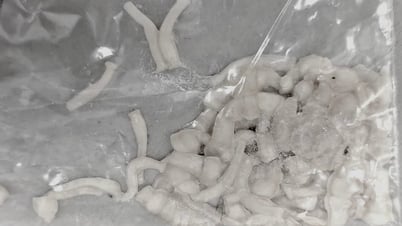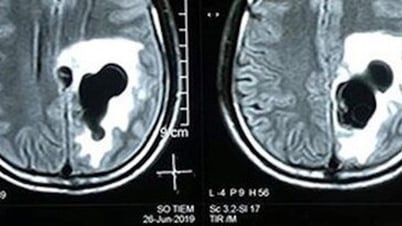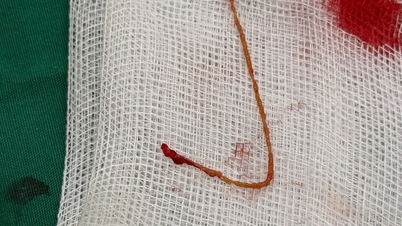A 50-year-old man from Thai Nguyen has a habit of eating raw food and blood pudding frequently. 10 years ago, he had to be treated for worms. This time, he saw worms in his stool so he went to get checked.
Test results showed he was infected with parasites, specifically tapeworms. After treatment, the patient passed about 10m of tapeworms.
According to doctors from the Department of Viruses and Parasites, Central Hospital for Tropical Diseases, this case requires hospitalization because deworming at home is not clean and safe, and can easily spread to others.
In addition, it is not possible to monitor how the patient takes the medicine and how the worm comes out.
To completely remove the worm, both the segment and the head must be removed. If the segment and head remain, the worm will continue to develop (like this patient who had already removed the worm but it was not completely gone).

Tapeworm disease is associated with the habit of eating raw or undercooked pork/beef. (Illustration photo)
Dr. Nguyen Thanh Binh, Deputy Head of the Department of Viruses and Parasites, said, “Taeniasis is caused by adult tapeworms including Taenia saginata, Taenia solium and Taenia asiatica that parasitize in the intestines. Tapeworms can parasitize humans in the form of adult worms and larvae.”
Human tapeworm disease is usually caused by pork tapeworm and beef tapeworm. Tapeworm disease is associated with the habit of eating raw or undercooked pork/beef.
When pork is rare, meaning not fully cooked, the egg and cyst forms of pork tapeworm can still survive and spread into the human body through eating.
Beef tapeworms are commonly found in the lean meat of cattle, especially in the internal organs. They can also be found ectopic in other animals, such as pigs.
Therefore, if we eat dishes made from undercooked beef and pork, we are at risk of tapeworm infection.
Tapeworm disease can cause nonspecific symptoms such as abdominal pain, nausea, diarrhea, or constipation as the tapeworm grows in the intestines.
Cysticercosis occurs when tapeworm eggs are ingested. Tapeworm eggs are excreted in the feces of infected people and can contaminate water and soil, which can then contaminate foods such as raw vegetables and aquatic plants exposed to tapeworm eggs.
Pork tapeworm larvae can develop in the muscles, skin, eyes, and central nervous system. Severe cases can cause severe headaches, vomiting, seizures, or epilepsy.
To prevent tapeworm disease, experts recommend that people should eat well-cooked food and drink boiled water; avoid eating raw or undercooked food; and keep the surrounding environment clean.
People need to practice proper hand hygiene, washing hands with soap before eating and after using the toilet.
Source





![[Photo] Cutting hills to make way for people to travel on route 14E that suffered landslides](https://vphoto.vietnam.vn/thumb/1200x675/vietnam/resource/IMAGE/2025/11/08/1762599969318_ndo_br_thiet-ke-chua-co-ten-2025-11-08t154639923-png.webp)





































![[Video] Hue Monuments reopen to welcome visitors](https://vphoto.vietnam.vn/thumb/402x226/vietnam/resource/IMAGE/2025/11/05/1762301089171_dung01-05-43-09still013-jpg.webp)
































































Comment (0)